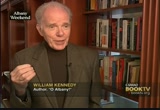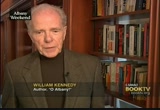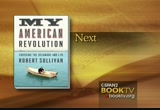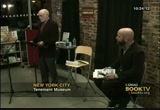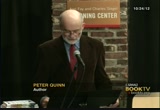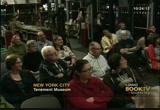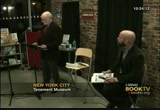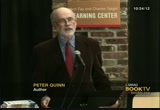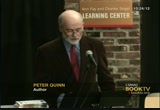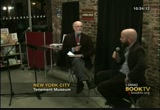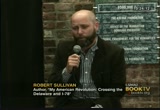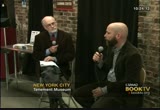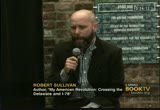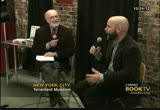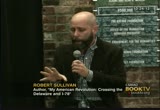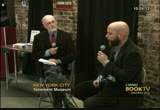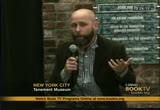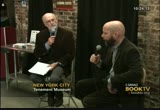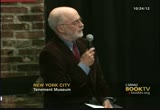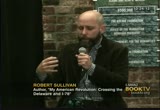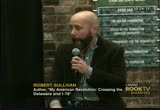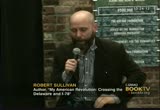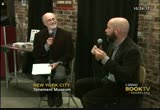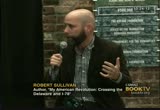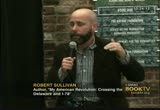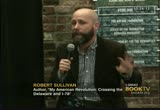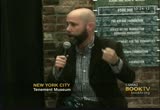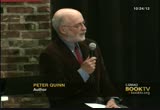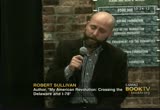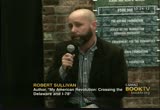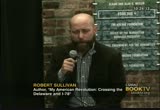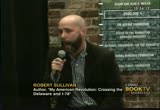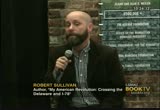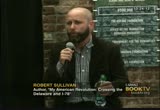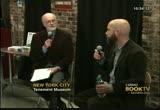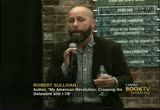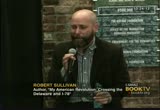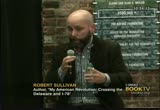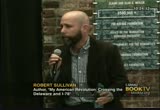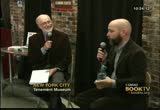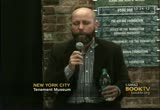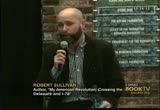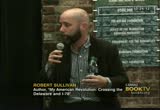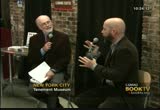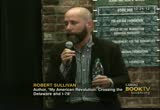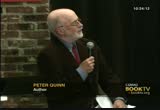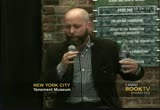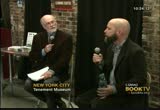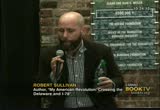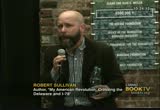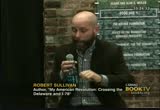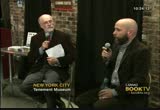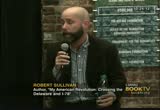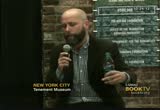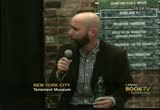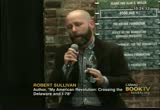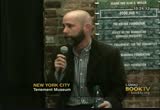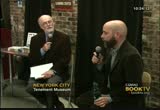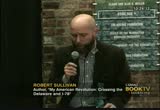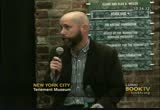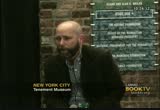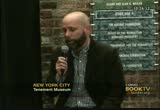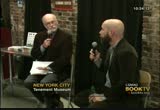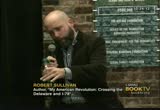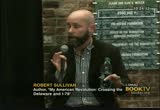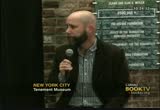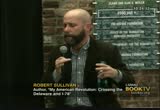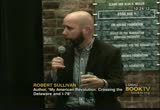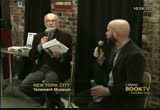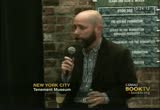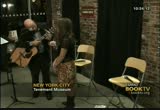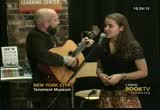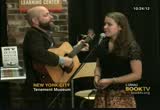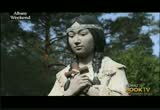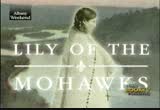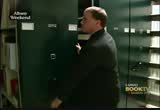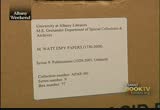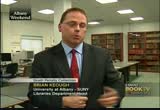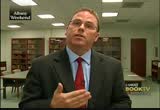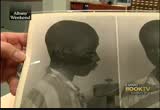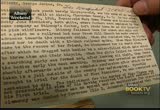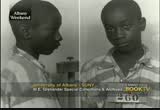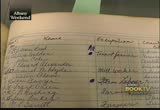tv Book TV CSPAN December 9, 2012 12:00am-1:30am EST
12:00 am
12:01 am
albany is about five or six towns all put together. it's troy, its colony, and saratoga. saratoga is only half an hour away. and, these are great places to live and to see and there is a lot to see in this town. the town is coming back. it's also it great, a beautiful town. it's a really beautiful town and a lot of people know it now. it doesn't have that reputation anymore that we thought it had. >> for more information on this and other cities on the local content vehicles tour go to c-span.org/localcontent. >> now on booktv robert sullivan presents a history of the american revolution with a focus on the middle colony, new york, new jersey and portions of
12:02 am
pennsylvania. it also recalls the importance of the region during the war and visit several sites to document their historical significance and view the landscape today. from washington's crossing of the delaware to the battle of her clan. it's about an hour, 15. [applause] >> the subtitle of this book is an old irishman not being funny, so it's a great honor to introduce the author and my friend, robert sullivan. i have known two geniuses in my life. one is dead and the other robert sullivan is alive although that robert sullivan is not the robert sullivan who is with us this evening. not exactly, but more about that in a moment. first this robert sullivan is the author of seven extraordinary books, meadowlands, the whale hunt, how do not to get rich, rats,
12:03 am
cross-country, the thoreau you don't know and the one that brings us here to delancey st., "my american revolution." in my humble opinion each of these books is in its way a masterpiece. wonderfully idiosyncratic, uniquely incisive, e. tizon investigation of the american mindscape and sulzgeber related with the american landscape. each confronts the obvious, where there are garbage drunk -- garbage dump or a family road trip or a transcendental windbag and allows us to see what we didn't and what we couldn't and that we did not want to, the spiritual, historical, existential connections that expose, subvert, demolish presumptions and require us to receive people and places and yes, rats with
12:04 am
fresh eyes. i've been amazed, enlightened, educated and contained by robert sullivan's books, none more so than "my american revolution." until i read bob's book i thought i was reasonably conversant for a college graduate of 40 years ago about the american revolution. from what we all know and most massachusetts virginia and the carolinas. in which the heroic continental army barely survived the winter in valley forge pennsylvania. one after the other, bob demolishes these myths and gives a new war centered around lawrence county new jersey aunts -- yes, you heard me right. the mountains 80% of which was fought on a terrain of the empire state-building. truth be told however, as well as admiration i have a grievance
12:05 am
with bob. both irish and brightest we both have grievances. i've been hurting deeply disappointed on a personal level that one of bob's books. five years ago in the fall of 2007 i reviewed howe to get rich, the common room magazine and i praised it as quote a profoundly funny book. a year later in the fall of 2008 in the midst of an act of collective subtlety in which the wall street dragged america and the world economy under their funeral pyre i realize sullivan had nothing kidding at all and instead of writing prophecy and disguised wisdom as whimsy and failed to include surefire ways not to get rich majoring -- or becoming a professional mandolin player, two of the most obvious ways of all if not
12:06 am
becoming rich. first, believing anything that anybody at anytime says on wall street. and second, from my perspective most important come, investing as i did your entire life savings in a 401(k) run by aol-time warner. now as well as a contributing editor to the boat and the father of the lot of books he is co-author along with his long-suffering wife suzanne of two incredibly talented children, louise and extraordinary singer and musician who i hope will make it here this evening and sam, who is currently attending yale which bob tells me is a four year institution in either hartford or new haven. let me begin our discussion by pointing out the fitting miss of discussing my american revolution here on delancey st.. delancey is where prominent you cannot family who fled to ireland in the 16th surgery a branch of the family subsequently emigrated to the
12:07 am
comment of new york where they became major landowners. their state included the place for you now sit and i now stand. during the revolution that delancey's were among new york's most steadfast loyalist. oliver delancey joined general howell on staten island in 1776 for the battle of new york and raised and equipped that delancey burt eight of three battalions consisting of 1500 loyalist volunteers who served as commanding officer on long island. the delancey's lead new york at the end of the revolution. they left behind a street with their name on it, that in the 19th century fell under the political sway of one of new york's great healers, big tim sullivan and ancestor of bob's, the so-called king of the bowery. the western end of delancey street was subsequently renamed kenmare street in honor of sullivan's mother who fled her native village in county carried during the great potato famine. i might add in the 1932 film
12:08 am
taxi, james cagney plays an irish cabdriver who can speak you -- prompting a cop to ask what part of ireland you come from? cagney replies, delancey st.. [laughter] as i mentioned at the outset the real bob sullivan could not be with us today. that bob sullivan had a previous engagement playing the mandolin with his society from his evil studies at in elizabeth new jersey. thinks arbitral groundbreaking cooperative effort on the part of dreamworks studios, the disney animation workshop, the pentagon's 3-d project and the museum we have this digital facsimile that is being mind managed by the real bob sullivan, papa genius from the other side of the hudson. so let's welcome bob sullivan. [applause] everybody thinks they know everything about --
12:09 am
>> i am speaking of all the robert sullivan's i know and most of them you knew first. there are a lot of rubber sullivans robert sullivan's and it might not the here tonight but thank you so much. we should just stop right there because i am so happy. and also . >> it will be a better night. i know that. >> so, when i write books, it's sort of how long can you put off not writing that book? and so you try to just not write books for a long time. i won't write that one and i won't write that one or a couple of books and ideas come back and more of those and i kept saying no, the "my american revolution," don't write a book because there are a lot of them. there are a lot of them and so,
12:10 am
but i couldn't beat it down and it's also one of those things you grow up and you heard about the world of time and it's kind of foggy and then the other project that comes, turns out to be one of my big projects or something. it's just a look around the city and look at the landscape and it's a really boring word but to look at where we are and so, to go back to the strategy of the land. >> i am serious, the book is an absolute revelation. i did think i knew about the american revolution or go to discover the content of the american revolution -- revolution was you know, you don't mention snooki in the book but the thought of while we know that? how did that escape history and you start out knowing that new jersey, you could see the entire revolution from the empire state-building? >> someone reminded the other
12:11 am
day, and i forgot all about this. 11 oregon for a lot of the '90s. my family and i, but before i went to oregon i used to go and have lunch all the time atop the empire state-building. i remember i was very happy after he wrote the rats book. budget guys who are churck guides at the empire state-building gave me free passes to the top and now is great. i used to have lunch up there and you know kind of obvious but it's a great view. >> really? >> really, really good view. i remember as a kid reading about lincoln, abe lincoln and him saying no, this is where it all happened. he was just trying to get votes in jersey i'm sure, but he kept saying i know that reading all about the war when i was a kid, the war happened in new jersey
12:12 am
and so there was always that idea and then you hang out any start doing the math. wow, most of the battles were here. and then you get into why did the value of -- the constitution happened and they did a big thing in philadelphia in the 1800's and they pushed valley forge at that time and even crossing the delaware, not a big deal for americans until the 1940s and 50's when it local historian takes it over and writes a book and sentenced sensed the book to general macarthur and and then she basically steals the painting and she won't give it back to them. people are getting married in front of it in pennsylvania and she won't give it back to them.
12:13 am
[inaudible] >> that was them thinking about other revolutions so there is a lot of how do you think about the revolution but anyways claiming this landscape, as the cockpit of the revolution, first there is the idea that wow, nobody is looking at it here. there are plaques all around and you can find people, sure but they general understanding is massachusetts is run by virginians. one in virginia farda massachusetts and concord lexington and of course saratoga. and of course there are battles off the coast of georgia and battles in canada and western europe, all over the place but
12:14 am
again the majority of battles are fought here. the really interesting thing to me is that most of the battles fought here, the big battles are lost, they are losses and the really incredible achievements, logistical achievements are migration. so that is probably the number one reason that we don't celebrate this area in full force. >> the other extraordinary thing you say is 8000 rebels were killed in action. 11,000 died in the prison ships. most of those are in new york. one ship has 7000. >> i think a total of the two prison ships that are off now the brooklyn navy yard two prison ships had something at
12:15 am
11,000 people that died on them. again they are not the people who you would necessarily build a giant memorial singularly. those prison ships, washington protests them all through the war. the people on the ships, they were not being fed and they were dying on the ships. if you were an officer or you had some money, but if you are neither of those things, then you died on them. the thing is, after the war, even 27% died on them. more people died on prison ships than died in all the battles but after the war nobody does anything about these prison ships filled with bones. they are still riding the ferry to manhattan and saying hey i can see these ruins out here and
12:16 am
all of these bones are on there. wittman is writing editorials in the 18 30s and 40s saying that we have to do something about this. we have made a memorial for general washington all the beautiful statues on wall street but nobody has done anything for the people of the general washington to donate big business funds and of course on the ships there is not just americans. there are sailors from all over the world and significantly because of who has power and the besnett power. what is really interesting is in the modern times to go to ft. green for dreamspark for this bones are initially moved -- -- eventually moved. they had to vote and so than they are brought and standard white build a monument that is
12:17 am
there now at ft. green which was a ford during the revolution but anyway they are there and in the 70's the city was having a hard time. i lived in the neighborhood and i met a guy and he was a member of black cowboys and african-american guy who was a big social justice guy. they called him the mayor of ft. green and some quarters and he was extremely cool. he died right after i saw him give a kind of -- speech at the memorial given every year for these prison ship deaths. he took care of them for years when nobody was taking care of them. mel gibson made a terrible movie a few years back in which the colonialists offer african-american slaves their freedom if they will fight on their side.
12:18 am
as you point out in the book it was the exact opposite. it was the british and people forget that new york was a slaveowning stayed until 1827. that is not part of the popular car justness so why why didn't every single african-american desert to the british? >> yeah, i read a couple of books on that. >> were african-americans fighting in the revolution? >> yeah and a first washington does not want to have -- them to fight in the continental army and they were won over and at the end of the war washington's generals, lafayette especially, said you have got to free them but he is reluctant to. it's a long story but there is an amazing moment i think up by the tappan zee bridge near niac
12:19 am
wherever they were negotiating, where washington was negotiating the evacuation of new york which would later become thanksgiving. this giant parade, the evacuation day parade celebrated for years and years. >> my father went to -- in 1911 and evacuation day was still celebrated. i think boston celebrates, the marathon. >> any way it was an amazing moment where washington was sitting there with the british and the rich are saying okay yeah we are going to leave and we are negotiating band the end of the war but you have to keep -- you have to allow african-americans who are fighting to be free. if we release the slaves they are going to be free and the people that have come to our site. washington says no so a lot of those people go to canada.
12:20 am
so yeah it's an ugly beginning. >> the other thing is, i lived in brooklyn near prospect park and it was the first time ever became aware of the battle of -- and talk about logistics. 25,000 troops in horses and artillery to take the port of new york. >> the best thing is all the diaries talk about coming in the summer of 1776 and is two months after the declaration of independence. two months after the declaration and the siege of boston. again not trying to downplay it. whether the british were actually going to leave, there is this idea in some recent scholarship that says the americans didn't so much kick them out as the british were planning on leaving anyway.
12:21 am
i'm not even going to go there but there is not a war on them. there is a colonial, you know, service. we declare war and we say we are independent. but yeah it would be the largest invasion since the day and all the collins note this in their diaries. the famous diarist noted coming and they can concede off staten island. sorry it sounds strange but i am walking down the street in the verrazano bridge from whatever borough ayman and i think oh wow that is where i would have seen the entire british fleet right there but the best line in the best thing that people note is they talk about the forest at math. i love that. i love it for two reasons. one because can't you see a forest of math and two because the british had run out of
12:22 am
timber to make a mast so they would either, i read about them slicing trees together from the north of germany or they would have use trees from maine and new england and new hampshire. it is not a tree place any more. they have cut down a lot of trees so this forest is an american forest coming into the harbor. but the thing about saying that you know, i'm sort of having a hard time because i don't want to say -- do i want to say hey look, all this happened here and just as so many things happened everyplace, but i don't want to champion probably a the chair will be thrown. i don't want to say the new york landscape is more important than any other landscape. i want to say that it was crucial and that the battle,
12:23 am
that it all happened here and i don't want to say we ignored it. we shouldn't ignore these losses of people and we should think about celebrating what we have learned. >> you make a great point in the book that one of the reasons washington isn't crashed is because -- [inaudible] >> the marblehead sailors. the people from massachusetts who understand water and you know, for instance when they cross -- >> they are routed in brooklyn. >> white plains happens this week. if you go up to the kids park in white plains i will guarantee you someone will be walking around. i ran into a guy and i said to him white plains? i just read the mccullough book or whatever. so anyway, so they get routed out of new york. they are chased out of upper manhattan. forget it, they race across the
12:24 am
meadow land. this must be an amazing moment. they are leaving -- racing through all the places we can barely talk about much less celebrate. one of my favorite places in the world, patterson. these are my favorite places. we don't talk about these places are co we don't talk about these places and so they raced through their and this is what tom payne is making no sob stuff is going to right. this incredible moment being chased by the continental army. everyone is ready to give it up to but to your point about the marble headers, when they get down to the delaware, which they will soon cross in a month or so, they get down to the delaware and the marble headers say i know crossing that you get every boat within one mile, get
12:25 am
all the posts either side just in case. that happened also when they were in new york city. we lose big-time and we evacuate from manhattan to brooklyn, pardon me from brooklyn to manhattan which is illegal today, either way. but anyway, when they evacuate, the same thing is happening. if you go back and look at the notes, you look at -- the marble headers general glover had said at the beginning of the summer can we have every single but you have anywhere or can we get it on the brooklyn side? you have the providential fog that comes in so we can evacuate, the providential fog. >> the revolution as one night away in the army of brooklyn? >> right. the providential fog that is a
12:26 am
dimension that counts is the fog that comes of every end of summer morning just about in the harbor in new york city which you see in the summer in the summer after in the summer after and that is the great thing. you are a lot younger than i but when you're just turning 50, you're like wow i have seen his this providential fog before soap providential gets into the details rather than the big fog. the other factor that, which, i lived in park slope and lease to buy a christmas tree on third avenue and seven straight. i'm reading this book and i'm reading, 400 maryland troops. in a sense america is born in brooklyn and you have people in marblehead being led by general from virginia. the first time these are the zorilla berrick is fighting.
12:27 am
this extraordinary event is happening in 240 soldiers died. tell the story of the mass grave. i almost wanted to cry after i read a. >> did you know when you look there? >> it was so goldstone house with a plaque on it but no i didn't know. again, it was a footnote to the american revolution, tiny footnote to the revolution. it was one of the most dramatic moments in the war. >> so what to me is really sad, i mean it's a really dramatic moment. basically, i'm not a military strategist. which you have far to glean but the way you sum it up is, americans and are waiting for the british to come up the east river and the british come around from behind. they come around at night and they cut them off and route them out so the americans all run you know, that down to the bottom of brooklyn to the other side of brooklyn so they can maybe you
12:28 am
know, maybe evacuate. and as they go, is the one maryland regiment, the people from delaware and maybe pennsylvania, the guys from pennsylvania were great shots evidently so this regiment says you guys go ahead and we will stand here in this swamp which is now the canal named for, not famous for the great giant oysters that it was once named for but named for belching bubbles of gunk. anyway, they put in what must have been a pretty cool swamp and they said you guys keep going and we will hold back the entire british army will hold back the entire british army right here at this old stone house where there was a mill in the pond and so they do. you can kind of see. i go for a run at lunchtime and you can see where people could
12:29 am
hold back and also there is a big swamp and so on. anyway in the neighborhood where i live, cobble hill, it was a hill at one point where there is now a trader joe's that is felt trader, trader joe's. at trader joe's, washington had a ford and there was afforded washington who look back at these guys and there's thankfully a plaque there today on the bank that claims that the navy and who knows what's true and what's not true and that the whole thing but washington looks back at the plow. those are brave men. but then they all died. the british come out once in the british come out again.
12:30 am
and then they take a third run and pretty much all of them are dead. and even more sad is the way i write, sometimes i write about how people think about the past or have thought about it, but an amazing guy named jamie kelly, who wrote, who became famous because he was on the subway gang and he -- and when he was on the gang they hit a dutch ship. what is called, the agent? >> is this a recent one? >> it's like, they built in the teens. >> believe it or not i was not born yet. >> but you know everything about new york city even though you are here just 43 years ago.
12:31 am
so this guy, jamie kelly, they had a dutch ship when they are taking the subway, dutch ship from the 1600's, the adrian block and kelly who just came from island, just an immigrant. he is an immigrant and he takes in the says hey everybody whoa, they're some kind of ship and there is just a guy marveling at this. he pulls it out and saves it and it's in the papers for a couple of days. what are we going to do with this? we will put it in the aquarium, and the fish tank. years later he happens to walk right and saves it again from a graham but in the meantime he becomes famous and becomes a vaudeville singer and travels around the world. he is jimmy kelly the subway gang man and he sang about the dutch ship that jamie kelly will now be appointed brooklyn borough historian the first ever by jimmy walker and then he will take it -- it becomes his cause
12:32 am
to promote brooklyn as the center of the world but definitely the battle of brooklyn, nobody gets this and he really goes about trying to say that these guys, these were buried en masse graves here in brooklyn. we have notes on where they are. >> there was testimony that some of the graves are still there. >> they are still there and they dug there and recently when i was writing this book they were taking a couple of new condo developments in that song. i was calling every archaeologist. can we just look around? anyway i couldn't get anybody to come down. jamie kelly tries to get this spot marked at the federal government and he gets the federal government to come in the federal government brings archaeologist. they find some stuff but in the end, and historian in team of archaeologists writes his this paper.
12:33 am
they write the official congressional report and they say that the maryland regiment was truly brave and while they did this you know, tremendous, this important thing, it is no more important than anything anyone else did in the war. something to that effect which you know, i mean you could just see jamie kelly saying oh my god, please note don't let this be the report but you can also just sit there and say wow, whose actions are more important than his other actions in who gets to judge? he gets even sadder for me, so, but somebody is recently talking about trying to find the site again and i knew and historian who is trying to get the sonar so maybe someday they will. >> to me, it's undeniable the
12:34 am
amnesia, knowing new york city history as a hopeless claim and he you just get more depressed all the time. is it just a trump principle that real estate takes precedence over everything else? why has their revolutionary been wiped out in new york and not in pennsylvania or massachusetts? >> the dynamic of the city is, i mean when i started doing this book i was just going to write about trees. >> what about helen bay? >> there is a rock with a plaque. the rock may have been moved in a plaque may have been moved. you know when i started doing this book i was going to move right about liberty treason they are all over the coast and the little colonies but there are trees out was that people attach a certain importance to and whether by tradition. george washington tied his horse fair or in cambridge there is a tree that finally fell and now
12:35 am
there is a papa says washington took command of the troops. he was nowhere near that tree. people believed it and loved it and love that tree. the tree in the boston commons and the hangman zelman washington square. people become attached to trees as these are markers of time. to talk about new york specifically, yeah i mean obviously, we develop, it's an old story. new york is always changing and that is considered good but there is something happening and i think historic preservation, there's something like i feel like i want to be part of it or i'm trying to be part of it that this idea that we preserve a place, preserve the building, okay but what is the use of the building are what is the perceived remembrances that live in the building still? suddenly i am thinking of that tree and they still have the stump of it.
12:36 am
it used to be out on the street but that is a tree reference so forget that. but i'm back in two into places and i think the latest moves, the new thinking in a store reservation is about preserving the use, so for instance i'm really fascinated by -- which is palm street. i'm sure either there were british soldiers chasing americans on the day a day when they were be evacuated and its amazing place. it has for decades and considered to be not working or going the same decades, hip-hop is invented pretty much in the town square mall. there are so many small businesses that start there. there was a woman who had a weak store and she was, she was just developed away very recently because the place is not working the city kept saying.
12:37 am
she had a weak store and one son was at the school of economics and her other son was at williams and she was doing fine. there was a guy who saved everything to open a sushi restaurant and now the whole block is gone because it was deemed as not being of value. the thing is you don't know how to recognize what is valuable use that had spent time value to the city we are living in now. we don't recognize it, but there is all this talk again in the last 10 years or so about publid maybe thinking that there is other value to the street friend since. well in that conversation, this conversation, it's all in the same room. we are in the same room now saying okay there is value. if you close the streets people don't walk on it and it doesn't
12:38 am
work any more. how they think and feel about a place as the value the place. so i think we are going to understand i am hoping and let's say 20 years that there are uses we need to propagate and help continue rather than create a new . >> one of the things you point out in this book and is so true i think in history because it's the same that is determining history as the weather. the founding father of american weather history. i thought i knew the founders of most american -- but david ludlum. >> he grew up in the wash hung mountains. >> it's that is not a revelation i don't know what will come of it. i was working up towards dobbs ferry and i look towards the hudson and i said people don't
12:39 am
know what those who are. >> i once lived in the town you lived in mostly because i stalked him basically. he looks happy and he is a great writer so i should live there. we live there for a while and part of this book comes out of just doing these dopey things, i.e. not that we do is dopey. that's not what i'm trying to say. i was on the hudson river and this is a town where the hudson is shouting at you. you turn the corner and the hudson, the hudson is an imax movie playing constantly in this town. it's incredibly new sit there and you go down to the water and you look at the water in a look at the hills and things become clear to you, or to me anyway. so yeah, so david ludlow is really interesting. he chronicled the americas
12:40 am
weather history, which is amazing unto itself but with that partly meant was that he went back and looked at people who kept notes on the weather, people who kept notes on the most mundane things. and then, you refer to it as the windbag, henry david thoreau. yeah, i am -- so thoreau kept weather logs and kept logs about when the flowers bloomed and his great project in his life was to create a calendar, and almanac of april 1, this stuff happens in our town historically forever, the waters at this level and these flowers bloom and so on. and that is an almanac. thoreau was a test with the george x., virgil's george x. and when you read it you are
12:41 am
reading this beautiful, you know there is a version put out by yale which is yes a four year school. i am not allowed on the campus. there is a translation by the yale university press and its in the the american farm vernacular. it's beautiful and it's just you know the fire, the summer, the wood burns and sparks fly into the night sky and what more need we celebrate? that is what virgil says and that is so mundane. i love how washington scholars fight over it, he means more when he talks about the light of day. and it's if you need to need more than that. after a while eugene made any more than the lightest spring day. the almanac is something that
12:42 am
every colonial had to have because they needed it. they lived in a time of cycles of title cycles and lunar cycles and these were the things that he used to navigate your life. one of the arguments is that we move from circles two lines. there is is an historian who wrote an amazing essay about circles two lines and after the enlightenment view boat by schedule. we make this move and it seems to me that you could try to look back and try to get back into the circle idea, get back into the almanac and really you know, so this book, sorry, this is a big introduction, hopefully big and then i cross the river and i climbed to the mountains and i breakthrough time. >> that is the basic part of the book, traveling the same route?
12:43 am
>> some books you get rid of time, there is no more time, so i do the seasons and i'm trying to line up all the history you know, the crossing of the delaware and the 1954 reenactment in the 1960's protest at the reenactment. i want them all to stack up and i want them all to be an almanac. one of the routes of the word almanac, nobody really knows where the word almanac comes from. one of the routes has to do with time and it's an arabic word, time board david's translation is faint almanac. he is looking at the weather and so not a reenactment, but a replacement. go to the place. it's very easy and you don't have to buy an outfit, although i would buy an outfit. kind of longing for an outfit at
12:44 am
the moment but they are pricey. you don't have to buy an outfit or coaches go to the place in the moment that it happened and in the title moment or the seasonal moment. you look at it and you say or you can even wake up in the morning in brooklyn in the kitchen and make coffee for your wife and look out the window and say look at that morning star next to the crescent moon. i thought kober. the connecticut regiment would have seen that here in brooklyn getting ready to go to white plains and again, it's dopey at least when i do it but suddenly it's that raw moment where wow, we are all tiny things. >> you talked about in your book how different areas have different revolutions but it's the same revolution but they go at it from different ways. one of the constants of the american revolution seems to be people's perceptions of washington and i'm just wondering, you stay away from the big figures and put the
12:45 am
spotlight where it belongs on the landscape of the small people, but washington is a figure in your vote. do you come to any conclusions about this man? do come away liking him or not liking him? >> probably i mean -- >> you say he did and when the revolution. he managed not to lose up what to think is a great line. >> i think is a genius stroke. -had great conversations with artists about the revolution and there is this idea that art and ritual and reenactment, the things we used to engage with our past so we can go forward and how do we negotiate? how do we use our ancestors and these things but anyway i was talking to, yeah i was actually talking to an artist in probably around 2000 he said, you know, and a lot of artists have painted washington. its audience but he just said you know, the genius of
12:46 am
washington is he did not win the war, he just didn't lose it. it sounds -- and then you see the washington mountains and then you think why do you go to new jersey and hang out in the mountains? if you hang out in the mountains in jersey you don't have to win the war. you can just spend a lot of time not losing it. i wrote about the major figures in my footnote so i thought the top of the book is about the figures not considered major and the weather and a lot of landscape and then the bottom of the book is the quote unquote big stuff. there is an amazing book, a brilliant book called the invention of washington by paul longmore and i have read a bunch of the biographies. the most recent big fees, you know, they make washington in kind of an hbo kind of biopic
12:47 am
washington which you can't help. if you're going to make a biopic, you're going to make a mythic figure but again i am seeing, i see it as the times making washington and i see the crossing of the delaware and them up on this ridge right after they crossed the delaware. the next day the battle of trenton and they are outside of town, things are going well and all of a sudden they are stuck up against the river on the top of the hill was swamped all around them and he is surrounded by farmers from pennsylvania and maryland and elsewhere but he is from the chesapeake bay and the delaware is going to dump into the chesapeake and the weather is really not very different from his farm. he is a surveyor and there is the joke about not rushmore. there is three surveyors and lincoln or something? i don't know but he is a surveyor. that is what he does.
12:48 am
he is a surveyor. anyway, so that night they are waiting. they are thinking what are we going to do? it's going to be over again and the wind changes and this guy gets cleared and you see this in everybody's dire ease. if you recognize the winter in this area, the wind picks up and you know it's going to be cold at night. you just know it. you've seen it a million times. by the time you are 50. so then, you can see washington and all the guys saying tonight it's going to freeze and sure enough it does freeze and they are able to go back around army and get all the way to princeton that night on a frozen rope that was mud and the british are saying the roads are muddy and we can't go. so i feel as if that is an example of the communal effort but washington in this book,
12:49 am
washington is painted by think again brilliantly as a guy who is very much a man of his times, who is trained to say, i would not want to be president only if you really need me. this is the kind of thing he does and he does want to be president and we see in this book that he has a lot of jealousies. and we see as a clothes horse and he loves clothing so much. that's okay because in the middle of the night there is a soldier from connecticut who is stumbling down a the hill across the delaware and will reach up and see this guy with a white cape stick his arm out and grab him from his white horse. works. he tells his buddies, that guy is with us. washington's weaknesses make him just so much more brilliant. the longmore should be noted was a big activist in the
12:50 am
handicapped rights movement and i realized after i read this vote, it was the kind of book where you're calling your family and saying listen to this, listen to this. i realize that he had typed the entire book with a pen in his mouth and he had worked for disabled rights. i saw him give a speech on video and after i read the book i realized he died weeks before he finished it. he was giving a speech in this video at another disabled rights memorial for another disabled rights person who died in longmore says that basically this guy, the movement made this a great man. >> one of your footnotes in the book made me read another book which i hate reading books that make me read another book. the really amazing at the end of
12:51 am
the american revolution is the whiskey rebellion. which in a way as the first great con job in american history. the same washington that thought what these men and wasn't only president to head the men while in office and essentially what happened was the ious from the war were brought up by alexander hamilton and they were worth about 10 cents. they were brought mostly by ex-army officers and they were paid on the dollar so to raise money and it was hamilton who came up with this great thing called the whiskey rebellion. if they called it the poor people's rebellion it would have been different. he wins an army and at one point of washington saying i don't know where these man's courage came from and how they stood all this and then he is president and leading an army. i guess we are all like that. >> i mean washington, i think that he is another great guy to half in charge. he is a guy who will actually
12:52 am
learn when he loses in a big battle. he will learn that i can't face these guys are knifed completely change my strategy. he is completely nimble intellectually offended the war and as president he is a differing guy. he doesn't like to send. he can't stand dissent and as a result you could argue that the election of 1800 which is more scandal, more scandalous than any ad we will see tonight during the next seven days or whatever. the two warring parties that he is held down for so long finally go after each other. washington is a different guy in this presidency. he changes, as you say we all do. he leads the army out to pennsylvania to get these guys who are rebellious. they don't want to pay the whiskey tax. hamilton has figured out -- >> its attacks on grain by the
12:53 am
way. >> the excess grain that farmers use after they have barely pay their rent, they are in pittsburgh and western pennsylvania, i'll pass carlisle but anyway they are paying rent back to the east on their land and they are barely making any money and all of a sudden they have got this opportunity to make money with it excess grain and so whiskey and then they will be taxed on it. basically there is an argument made by bill hoagland whose book, founding fathers, they are drinking whiskey there at the reading. he writes about this and i used him. basically the idea is that hamilton and washington and everyone was saying during the war, these british are making us pay. they created this idea public debt and that funds their army and its horrible. they are making us pay as
12:54 am
columnist. we have to pay the higher prices on stuff to fund their debt. they go to war and its horrible. they come to the army and they say why don't we start the public debt. we will start that whole sinking fund thing which they do and after the war hamilton is trying to create the modern economy that people extol him for now and it's a great giant financial thing but to pay for you know the bonds, the profit on the bond, they are basically using these farmers to boil it all down the tax. >> it sounds to me like trouble. >> exactly, exactly so washington gets off his horse and he turns around. he gets off then he turns back to washington after he makes it halfway there. he turns around and carlisle and hamilton takes it on. hamilton who is the great rival with jefferson, a hamilton and
12:55 am
you can argue played washington or he didn't, i don't know but hamilton takes the army on and basically lobs -- locks up all these guys and they will be released later for nothing. all these farmers because they are enemies, they are his enemies and its horrible. >> do you think there was a stolen revolution? >> there was a second revolution. >> that didn't happen? >> is often said. >> that is one left-wing interpretation i was wondering what your take is on a. >> my interpretation is the declaration of independence and incredibly radical document and there's a plebiscite in pennsylvania. the unionization in a sense of the militias is what gets a yes vote in some ways and then the constitution basically they say you know how we were talking about being radical place in the
12:56 am
declaration? we will back that down a bit. the constitution is a different revolution and things go back and forth from there. >> we should open the floor to questions and you have written seven books. i have always found one of the most disappointing moments in my life is when i finished writing a book and i had to start over again and sometimes i don't have an idea of. what is the next bob sullivan book? 's we will be here for the next book reading. and i mean it. i'm a tremendous admirer and i think everyone of your books is a revelation. e.u. are so entertaining and learning at the same time in your extraordinary. >> i just read his books, i'm not kidding. i am trying to write a book and it's so depressing.
12:57 am
it's so depressing. i can't begin to tell you. i'm trying to write a book and for 23 years i've been trying not to write about him. his name is osullivan so seems kind of you know, silly to write about him but he is a civil war photographer. i just realized timothy o'sullivan is born of the famine so he sees all of that death and then he comes and goes to the civil war and he takes the most beautiful pictures. >> he works for matthew brady? >> he takes brady's best pictures and you will take a picture of a regiment that he knows one day and the next day he will take a photo of them all dead on the battlefield. then he will go west and take those in the west so there's this idea that theaters -- we hear about soldiers coming back
12:58 am
from work today and everything they must go through and how difficult and horrible it it is and then you think about this and think about the photos he took in the west that are tremendous photos. my wife has a degree in photography and i used to hang out with a lot of photographers and her when we first met in iowa ring up the sky. they would just say wow his photos from the 18 60's are the most incredible photos. >> is he one of the first photographers to put a camera on an empty landscape? >> that is a good question. >> there is always a face in it. >> you will like this maybe. a lot of what is going on with photography at that time has to do with claiming land so a lot of the photography that the french are doing in egypt is about a visual colonization, but claiming this place for this
12:59 am
nation. when he goes out and o'sullivan goes out in surveys for the usgs, for the u.s. government, he is part of that but there are things he is saying in the photos that make you wonder. where he for instance puts a ruler, a ruler underneath a rock that talks about, that has an inscription in spanish that says when the spanish ruled. and then you are thinking, and he is making fun of his survey captains but the great thing is, we don't really know what he thought and he didn't leave much at all. >> we will be done with him for sure. >> so we will open the floor to questions. jack, what is your question?
1:00 am
>> hi. a great talk, really enjoyed it. a two-parter. is the -- still around and the historical preservation office? >> well, the agent block is still around. where is a? there is a conference about it recently, and maybe three years ago at the india house but there are pieces of it still around. after the second time jamie kelly founded at the aquarium that robert moses was knocking down, he got it somewhere. maybe it's the historical society. i don't now remember it is but no, should have contacted them. i called the borough historian but it did not take. yeah, the state, okay. ..
1:02 am
notice that. at for washington now. i realize this thing that changed the landscape of manhattan was the seat -- of the steam shovel. it would take nine centuries to flatten with a shovel. women from a low reside or colonial middle-class housewives-- housewives going to watch the battle. if you come to the corner of pit you are on the rise but there was a 90-foot precipice that they leveled. if you walk down nassau street toward made in a new pnc it is with the maids
1:03 am
went to wash the clothes of the stream. you can see the curve of the earth. the old list built by dennis is the old jewish cemetery. it is on a rise there was a battle there. >> there is a new book about john rand paul the guy who surveyed the grid the maker of the grid. i read it. it confirmed the idea that what we are learning is the book that we have discussed here is beautiful and the
1:04 am
adr what this city was it is called mahatta it is a book of mountain and hills and it could help us to go forward. i don't think to think that is gone. this new book talks to lot of people who surveyed the land all over the city the really amazing thing that they find is how much of the landscape is still the landscape. the hill behind was top-down. the percentage is going up how much remains. that is a big thing.
1:05 am
>> did another point* they were taking them down tilt -- downtown yes then you come up the hill. >> you don't feel it. >> was training for the marathon and carnegie hill is still a hill on the upper east side. the big news is there is a lot there. recently did a project with an artist at the gucci museum and she showed house since that creek was still there but i wrote to about the history of the creek but
1:06 am
the landscape that is there now tells you that there was a creek there. where the river is a marshland you will find public-housing toward utilities that is considered a lesser value. but sunset creek where there is a ton of repair shops britannia mr. -- numerous late which is where people store their food cards. where there was of water supply and the the nourishment that the salt marsh gives us is mindich by
1:07 am
the human settlement. i want to give it another name but the city looks at the area is typically to say this is an area not being used to it's full potential. oh no. talk about ecology talk called that charge is the estuary. >> to mention hastings the back of the town bases the river. then the hudson was filled with factories and it was noisy.
1:08 am
everybody one did to move up the hill. the poor lived at the bottom. it is also economics that changes sometimes to the detriment the end of largest copper prices was in hastings. now $2 million every chemical known to the egyptians. the tallest point* of the palisades. what were they thinking? out drive make a living. >> we use the rivers and we cannot just say they are for recreation only so now the problem is only for recreation. >> should we rapid up?
1:09 am
1:10 am
1:11 am
1:12 am
1:13 am
1:14 am
1:15 am
worth three performers of the mohawk valley 10 years before she was born she is the louis that has bloomed out of that spiritual effort by the jesuits of the 17th century. she escapes and went up to montreal st. francis in xavier mission. she came to the attention of a priest that was the spiritual refugee from france. when he encountered hurt he saw this incredible spirituality that was unexpressed that he could drop out of her to allow her deep devotion to jesus christ to heal his own spiritual battle.
1:16 am
there was a confluence there that i think is a love story of a high-level that we could not appreciate. they had a union they circled each other and they observe each other. she died at the age of 24 immediately after her body was transfigured. she has already passed away and was a recluse with only a couple of the male friends. they started securing.
1:17 am
they burned some of her garments to have a tea out of it to and the miracles kept up through the 1760s when the english came to take canada from the french and then it ceased. payback in the 1840's. they discovered her and they got irked manuscripts from the archives. and she started to affect more cures. what prompted the pope to canonize hurt is in the state of washington -- fell down and hit his lip balm
1:18 am
the pedestal and was afflicted with the flesh eating bacteria. google his name is jake. there are pictures of him. his surgeons were miraculously the way they could graft the skid and they attribute his cure to her intercession and was that it -- verified through the vatican that these are paranormal occurrences that could only come from above. the process is still slow.
1:19 am
they decided last year to canonize her october 21st the biography is where you take the fact and you tried to make a story. you try to get the motive motive, human psychology, we know how we tried to make it real in a way that this sympathetic. it is true in the deeper way so you try to tell the story in a way that is productive to "the reader" that they say what to what i have done?
1:20 am
and a great movie or book does that. it is the artistic creation but other they and the bare facts anything written about her past have some degree of fiction from whoever writes it. i a tried to show her with the struggle surmounting these issues in her life what it did to her and brought her to a place that the whole catholic world reveres her and told in such a way that people find it an enjoyable experience to
1:21 am
1:22 am
the archive was started at the university of albany in 2001 with of partnership of the archivist and faculty members of criminal-justice. there is no national death penalty for documentation capital punishment so we set forth to establish the archive. we reach out to the organization's at or our propons and these individuals who form the ideas that framed the debate that goes on and
1:23 am
and the legal arena over the death penalty. toda organization's and significant individuals working to abolish capital punishment or our proponents and these individuals who form the ideas that framed the debate that goes on and and the legal arena over the death penalty. today what to show you a collection from said gentlemen recognized as the foremost historian of the death penalty on the united -- in the united states and started to do research in the '60s as a traveling salesman and became so fascinated that he was the proponent but was so fascinated he quit his job and dedicated his life to document every single person executed in the united states. when he started his work, there was estimates may be fibrous 6,000 people after the three decades he
1:24 am
documented 16,000 he collected the sources and i will show you some of these documents. here is a picture from his home in alabama surrounded by the walls of his home with people who were executed. he went to small city governments, county government, local research to document his goal with every single person executed. >> one-person compiled the affirmation was the angus person to be executed in the united states everything of capital punishment one of the themes is the execution of children is it right to
1:25 am
execute children? is a proper to execute those who are mentally ill? then is the factor of race and has spent statistically proven that race is a mitigating factor the cyrus of the themes you can draw out to here is george was 14 years old when he was convicted of killing an 11 year-old girl he was 14 years old and bear the 95 pounds. 5-foot tall and was swiftly convicted and executed
1:26 am
within three months. when he was executed he was put to in the electric chair built for adults so they could barely get the straps around his wrist because he was so skinny. it speaks to the issue to one to execute people who were children? then he would create an index card. here we see george and he created a card barely 14 years old from south carolina, march 1 2/4, 1944. encountered the eight year-old and 11 year-old
1:27 am
carol who worked with his ly 14r. years old from south carolina, march 1 2/4, 1944. encountered the eight year-old and 11 year-old carol who worked with his father. and a fairly brutal crime was committed. speedily brought to trial for the death and convicted and sentenced to die but did not receive the death sentence clemency was denied. whose stated "the brutality of the crime vacated any from his yacht youthfulness he admitted to the murders after the conviction a ready-made no comment after entering said death chamber with a bible and the guards had trouble putting his frame into the chair. at the time of his execution
1:28 am
14 years, five months old. the papers contained 90 boxes of records and index cards on 16,000 people who were executed the first person executed was 16 '08 in jamestown virginia james campbell lettuce convicted for espionage and his father managed day bank. but he wrote down every single person when he discovered they were executed. so you will see the would name the
1:29 am
247 Views
IN COLLECTIONS
CSPAN2 Television Archive
Television Archive  Television Archive News Search Service
Television Archive News Search Service 
Uploaded by TV Archive on

 Live Music Archive
Live Music Archive Librivox Free Audio
Librivox Free Audio Metropolitan Museum
Metropolitan Museum Cleveland Museum of Art
Cleveland Museum of Art Internet Arcade
Internet Arcade Console Living Room
Console Living Room Books to Borrow
Books to Borrow Open Library
Open Library TV News
TV News Understanding 9/11
Understanding 9/11